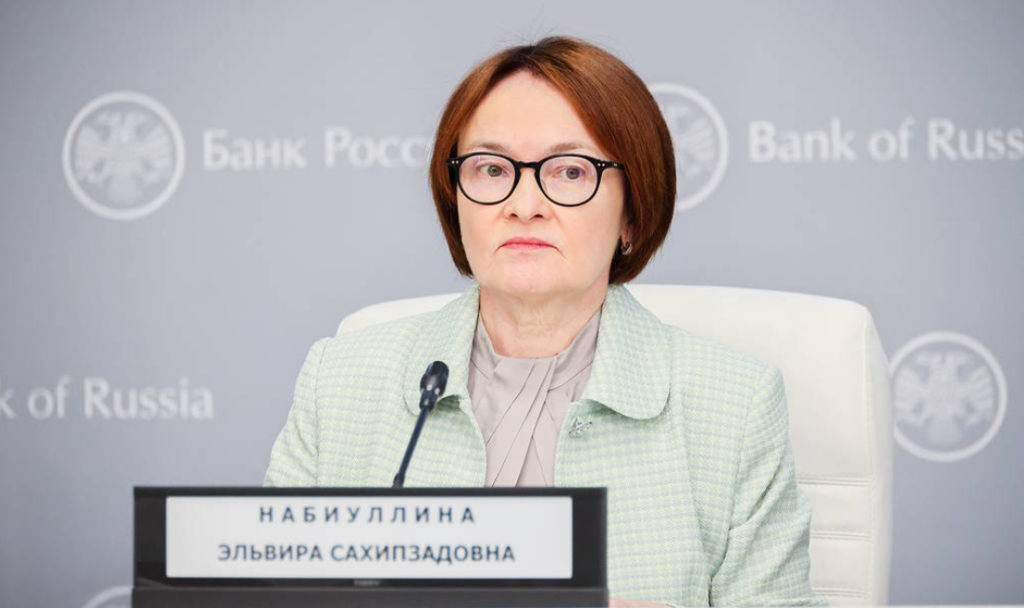Russia’s slowing economic growth, lower inflation — Central Bank highlights by Elvira Nabiullina

Russian Central Bank Governor Elvira Nabiullina © Evgeniy Messman/TASS
by TASS [9-12-2025].
The current economic situation sets the general direction for reducing the key rate, Elvira Nabiullina said.
MOSCOW, September 12. /TASS/. The slowdown of the Russian economy is in line with the Central Bank’s expectations, but closer to their lower boundary, Central Bank chief Elvira Nabiullina said at the press conference after the regulator’s Board meeting.
She also noted that the latest data show that raising the key rate works is working, and inflation is declining.
On Friday, the Bank of Russia lowered the key interest rate for the third consecutive time, this time by 1 percentage point, bringing it down to 17% per annum.
TASS has collected key statements of the Governor of the Bank of Russia.
About key rate
The Central Bank will act carefully when making subsequent decisions on the key rate, "assessing the further adjustment of monetary conditions and the reaction of the markets," Nabiullina said.
The current economic situation sets the general direction for reducing the key rate, Nabiullina said.
"Inflation has fallen significantly since the beginning of the year, external demand and economic activity have slowed down," she told a press conference following the regulator’s board meeting on the key rate.
Much at the meeting on the key rate in October "will depend on what budget parameters are ultimately proposed."
At the meeting the Board of the Central Bank also considered an option to maintain the key rate, in addition to cutting it by 1 percentage point.
"The arguments for maintaining the rate were that monetary conditions have eased significantly. We need to assess the consequences of the decisions already made. Of course, we need to get more information about what the budget policy will ultimately be."
On inflation
Inflation expectations "remain high and have hardly decreased among all groups of the population, businesses and financial markets."
The latest data show that "the key rate increase is working, inflation is decreasing."
The main disinflationary effect caused by the strengthening of the ruble "has already ended."
The Central Bank is proceeding from the disinflationary effect of the budget on monetary policy, "but to what extent this will be clarified when amendments are made to this year's budget."
On national economy
The economy will continue to grow in 2026, but "the more overheated, the more noticeable the economic slowdown will be."
Attempts to accelerate economic growth without balancing supply and demand will lead to an acceleration of inflation: "And ultimately, this will hit sustainable growth."
It is a mistake to consider a decline in GDP growth as a completed recession if other indicators do not confirm it: "Therefore, even the statement about a technical recession today looks, at the very least, debatable."
The economic slowdown is occurring in line with the Central Bank's expectations, "but closer to the lower boundary."
On prices and demand
The Central Bank expects the situation with fuel prices to stabilize.
"Considering the government's measures to limit exports and increase supply on the domestic market, we expect the situation here to stabilize," Nabiullina said.
The Central Bank sees growth in demand for cars and housing: "Consumer demand in July-August increased. In those sectors where there was a decline in sales in previous periods, the situation has now improved," she said.
The Central Bank "does not expect a new round of growth in housing prices in the context of lower mortgage rates."
On the decline in financial results of mining companies
The decline in the financial results of mining companies was mainly caused by external conditions: "According to our estimates, the main reason for the decline in the financial results of many mining companies was the external environment."
On lending and deposit rates
Retail lending revived in August: "It affected both mortgages and the unsecured segment. After a lull at the beginning of the year, demand for car loans has increased."
The growth of lending to the economy this year may exceed the current forecast of the Central Bank. The fundamental solution to the availability of loans for business is low inflation: "We all understand that the movement towards low inflation, towards moderate interest rates, is a slow process, especially after the growth of inflation," Nabiullina said.
"Long-term" loans will be available only with low inflation: "This goal will be achieved."
Mortgages are growing, "most developers remain profitable."
The share of problem loans in banks is about 1%: "This is a very small share."
The Central Bank "closely monitors" the dynamics of rates on banking products, banks reasonably reduce rates on deposits following inflation.
Preferential credit programs require large expenditures from the state budget, such programs "must be target ones."
About savings and accounts of Russians
The Central Bank "does not see a switch" to foreign currency in the savings of Russians, citizens keep money in rubles.
The Central Bank expressed concern about unjustified blocking of citizens' funds: "And, of course, it is very important to take all measures to ensure that the funds of absolutely bona fide people are not blocked," the governor of the Central Bank said.